The long-running bromance between cycling and coffee has brewed up a new lovechild.
Amunra Pure Performance Coffee is a brand-new coffee, developed by sports scientists and nutritionists for endurance athletes, which is claimed to help maximise cycling performance and recovery.
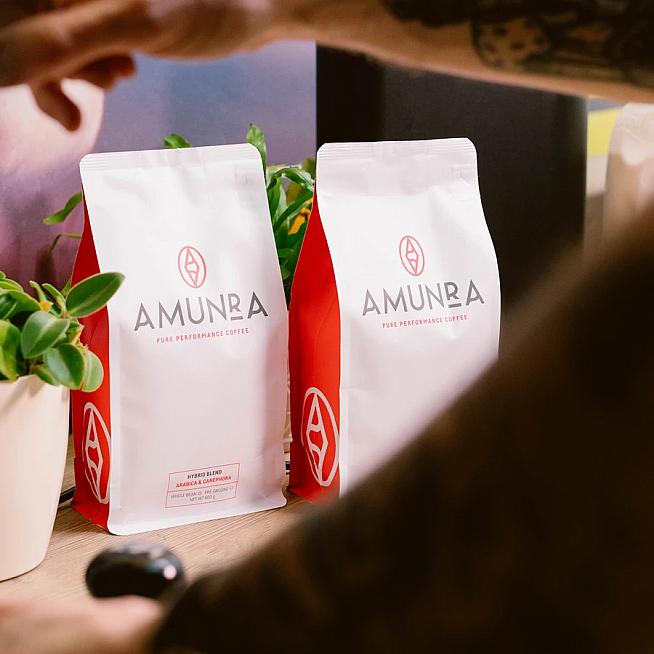
The thread that links coffee to cycling can be traced back to the Italians. Riders like Fausto Coppi and Gino Bartali lit up the sport in the 1940s and 50s with their duels on the stone chipped roads that criss-crossed the Alps.
Images of these stars and their water-carrying teammates casually sipping on a double espresso pre-race or in training helped showcase the laid-back chic of Italian café culture to an outside world still dusting itself down after years of war and rations.
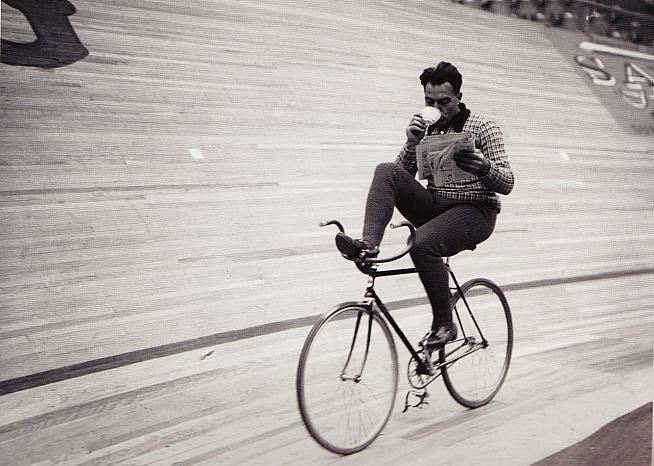
Cyclists in the UK at this time may not have had the money to buy the latest Italian equipment or clothing, but they could emulate their continental heroes and indulge themselves with a coffee that was becoming increasingly available and affordable. A Milanese manufacturer of coffee machines called Faema cashed in on this connection when they sponsored their own cycling team from 1955.
Legends of the sport such as the Spaniard Fedirico Bahamontes, and the Belgian Rik Van Looy helped promote the brand throughout Europe in the 1960s, carrying the Faema name across the victory line and into the radio and newspaper reports that documented this era of racing.
When Eddy Merckx swept the board in his first Grand Tour - the 1968 Giro - winning the points, mountain and overall classification, he was wearing a Faema jersey and showcasing the brand to an even wider audience.
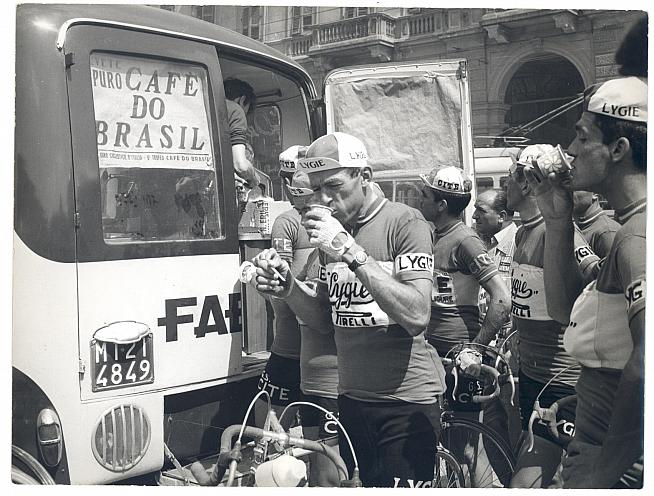
The association between coffee and cycling has since been strengthened and brought to a growing global TV audience by other teams in the 1980s (Café de Colombia), 1990s and 2000s (Saeco - another Italian coffee machine maker) and present day (Trek Segafredo). Coffee is now integral to the sport and culture of cycling: team buses are equipped with state-of-the-art coffee machines; Rapha has a chain of 'Clubhouse cafes'; whilst pro-wannabes pore over the length of their lungos as much as their socks.
Of course, coffee isn't the only foodstuff to have benefited from sponsorship in cycling. Eddy Merckx went on to earn most of his victories riding for another Italian team sponsored by 'Molteni' - a salami manufacturer based in Arcore, near Milan. So why aren't cyclists' pockets bulging with Peperami sausages, or butchers' shops the destination of choice for Sunday club runs?
Magic beans
It is of course the mystical benefits of coffee on cycling performance that has cemented the bond between the two. Fans seeing their heroes racing each other up and down mountains, fuelled by nothing more than coffee, was the perfect mythical advertisement for the health-giving benefits of coffee.
It's not just advertising froth though. The impact of caffeine on the body is now well known - elevating adrenaline levels which in turn increase your heart rate, blood pressure and levels of concentration as part of the body's 'fight or flight' response. Less known are claims that coffee can reduce the rate of perceived exertion, so that exercising feels easier, allowing athletes to train harder for longer.
Like amphetamines, caffeine use can lead to increased dopamine levels in your system and mild feelings of euphoria, without the downsides of having to be bought from some dodgy fella in a pub, or taken in a manky night club toilet.
When you consider the fact that cycling on its own has also been shown to boost other mood-enhancing hormones such as anandamide - a natural cannabinoid - it's a little surprising that coffee-drinking cyclists haven't yet secured their own field at Glastonbury, to mong around 'til dawn in Lycra clogging up their cleats with mud.
As well as enhancing performance and mood in the short term, caffeine is also said to be able to improve the body's recovery from exercise. Coffee is full of antioxidants, which can help muscles recover by mopping up free radicals - metabolic by-products which can cause tissue damage and inflammation. Studies have also found that caffeine can increase the re-synthesis of glycogen fuel after exercise - helping to replenish stocks of the main fuel used by muscle cells in the body when cycling.
It's not just the caffeine in coffee that is said to be beneficial to the body. Coffee is also a rich source of polyphenols - a class of micro-nutrients found in some plant-based foods - that are also packed with antioxidants which help reduce post-exercise inflammation. The type of polyphenol found in coffee are also associated with easing digestion in the short term, and provide more enduring health benefits such as helping to prevent heart disease, cancer and Type 2 diabetes.
An extra shot of science
So what makes Amunra's coffee so special for cyclists? Why should you switch out your normal coffee for this 'pure performance coffee'?
One problem that performance athletes have is that the amount of caffeine found in coffee varies wildly according to the blend of beans used and the method of preparation. This leads to either a lower dose of caffeine with reduced benefits, or too high a dose causing anxiety, nervousness, a racing heart and skittishness.
Amunra have tried to limit this variance by creating a blend that delivers 180mg of caffeine per serving, which they claim is the optimal dose, as well as a high content of 160mg of polyphenols.
Coffee nerds will love the very scientific looking set of instructions that Amunra provide for preparing their coffee in either an espresso machine, a cafetiere, a pour over drip-filter or an Aeropress. To ensure that the amount of caffeine in each serving is consistent, Amunra gives exact values for all the variables in the brewing process: coffee grounds' coarseness and quantity, water volume and temperature, and brewing time measured to the second. Amunra have given the art of making coffee a scientific makeover that Heston Blumenthal would be proud of.
The fact that we all have different physiologies that will respond to this exact caffeine dose in very different ways from one day to the next is one variable that can't be controlled for, and something that you'll just have to figure out for yourself.
Amunra do suggest, however, that for maximum benefit their coffee should be drunk between 20-90 minutes before exercise begins, and that caffeine levels remain elevated in the blood for up to three hours after consumption.
The daily grind
Anyway, so much for all the science - how does the coffee actually perform outside the laboratory and in the real world?
I've lost my cycling mojo recently, so was interested in trying out this coffee to see if it would give my cycle training a much needed chemical re-boot.
As I don't own a fancy coffee machine, I opted for a 500g bag of coarsely ground Amunra, which wouldn't need any further grinding, and could be brewed in a cafetière.
The coffee came packaged in an impressive looking air-tight bag, with a one-way valve and zip lock to keep the contents as fresh as possible.
I also received an Amunra branded re-usable 'Keep Cup' that is said to be 'the world's first barista standard reusable cup'. It resembles an adult 'Tommee-Tippee' cup - albeit made of glass - but I'm sure the moustachioed coffee-police that work in the local independent coffee shops will think I'm a player when I slide it across the counter with a knowing wink.
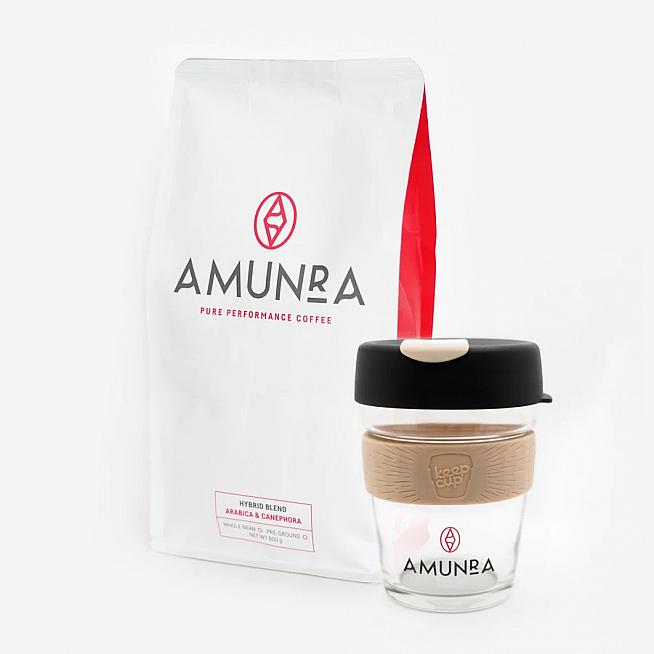
I've been drinking a cup of Amunra before each ride over the last few weeks - whether on the turbo or outside. At first, I followed the instructions carefully - measuring out the quantities of coffee and water used in the cafetierre as well as the brewing time, in a process that had me daydreaming about meth labs and 'Breaking Bad'.
I couldn't guarantee that the water out of the kettle was at 90C coz we've only got one of those poke-it-in-your ear thermometers at home, but I could measure out 250ml accurately.
Similarly, I couldn't be sure that four teaspoons equalled 18g of coffee, but it was probably close enough, and I can use a watch well enough to accurately brew the coffee for five minutes before pressing down the plunger.
Needless to say, I soon got tired of this palaver and resorted to shaking a 'bit' of coffee into the pot, adding 'some' boiling water and leaving it to brew for a 'few' minutes, whilst I got changed into my cycling gear.
Noticeable effects on my performance didn't seem to differ however carefully I brewed up - I still managed to get that caffeine high on my own supply.
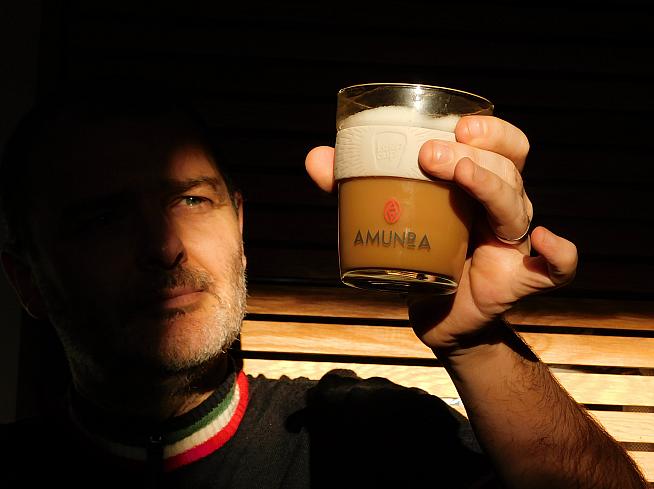
The strong caffeine content of Amunra coffee did mean that I started turbo sessions with a higher heart rate than normal - 70-80bpm rather than my normal 60-70bpm. But the sessions still seemed to physically and mentally hurt as much as normal.
I've taken caffeine gels before and during races in the past, and found that the extra alertness the caffeine gave me was beneficial when an increase in reaction time can be the difference between either being able to move easily from one wheel to another in a tight bunch, or letting small gaps open up that increasingly wear down your energy stores and resolve.
Particularly in the closing laps of a tight crit race, when the speeds go up and the tension in the bunch rises, the psychological boost you can get when taking that last caffeine gel can be really beneficial. But it's a long time since I've been fit enough to race, so the increased alertness the coffee gave me on the turbo frankly felt wasted.
Likewise I'd be lying if I said that my unscientific coffee consumption had any perceivable impact on my recovery after riding.
Perhaps if I was somewhere close to my peak fitness, more in tune with my body and racing a couple of times a week I'd be seeing and feeling the benefits of meticulously measured coffee consumption both during and after rides. I can see then, how drinking this coffee before a race or event would become just another part of the preparation - like warming up carefully on the turbo, taking a post ride recovery shake, or rolling out tired muscles.
But I'm not in that place at the moment either physically or mentally.
Tasting notes
Still, even if the performance benefits of this coffee haven't become immediately obvious to me, it is a lovely-tasting coffee.
To help me come up with some fancy words to describe the taste I brought a flask of Amunra on a ride with my friend James.
James is a coffee snob. I know this because I witnessed him standing lamely in front of a Costa coffee machine in a petrol station, proudly ignorant of how the thing worked.
He then claimed that:
a) the coffee that came out was like a 'milk shake'; and
b) coffee tasting like milkshake is a 'bad thing'.
Needless to say, James wasn't impressed by the milk or sugar I'd added, nor the strange lumpy bits that had congealed at the bottom of the flask. He tried to educate me about the different qualities of the arabica and robusta beans used in the blend, but my eyes soon began to glaze over, and I started daydreaming about Gareth Hunt, Nescafe and simpler times.
Another friend, Will, wasn't much help either when it came to describing the taste. He suggested that I should just 'make shit up' about the flavour, which doesn't sit well with me, or the judges of the Pulitzer prize... if they're reading this.
So, rather than struggle on, I cheated a little and had a good read of the tasting notes on the Amunra website. Amunra's claim that their coffee "hits the spot taste wise...with a mix of smooth dark chocolate, sweet molasses, toasted hazelnuts and a hint of spice" suggest that you'd get a similar taste experience if you gobbled down in one go the top layer from a box of Milk Tray.
Now, I've been told I'm very suggestable (and who am I to argue), but weirdly, after reading these tasting notes, some long-dead part of my brain connected to my tongue sparked into life and definitely did start to register a dark chocolate and toasted hazelnut taste when I drank their coffee!
I'm not sure about the 'spice' description (as that's a bit of a broad term which pretty much covers all other tastes out there), but I can also vouch for the presence of a sweet molasses taste (although this is probably down to the teaspoon of sugar I add).
As you can tell, I'm certainly no expert when it comes to tasting coffee, and would probably fail in a blind taste-test between one cup lovingly crafted by an expert barista, and another filtered through an unwashed chamois. One thing I can say though, is that although Amunra coffee has a high caffeine content, they've managed to create a blend that isn't overwhelmingly strong and doesn't taste too bitter - in short, a really pleasant cup of coffee.
So, if you take your coffee as seriously as your cycling, or are fastidious about your diet, training, performance and recovery, Amunra might well be worth a try.
Whether the performance benefits are readily obvious or imagined, this coffee might just give you the edge in that next event you've got lined up, and a whole new marginal gain to rattle on about at your next coffee stop.
Amunra Pure Performance Coffee - £17.99 for 500g of Beans or Coarse Ground from amunrauk.com
0 Comments





